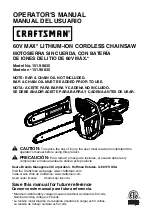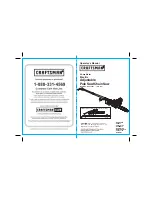
Check for parts online at
www.getearthquake.com
or call 800-345-6007 M-F 8-5
5
Operator's Manual
CS3814, CS3816, CS4116 Chainsaws
• Always hold the chainsaw firmly with both hands when the
engine is running. Use a firm grip with thumb and fingers
encircling the chainsaw handles.
• When carrying from one place to another, always stop the
engine and hold the saw with the guide bar and saw chain
behind you and the muffler away from your body.
• Always inspect the chainsaw for worn, loose, or damaged parts.
Never operate a chainsaw that has been damaged, improperly
adjusted, or is not completely and securely assembled.
• Use extreme caution when cutting small brush and saplings.
Thinner material may be caught by the chain and could whip
back toward you or pull you off balance.
• When cutting limbs under tension, stay alert for “spring back”
so you are not struck when the tension in the wood fibers is
released.
• Always shut off the engine before setting the chainsaw down.
• Keep the handles dry, clean, and free of lubricants, oils and fuel.
kickback
Kickback may occur when the guide bar nose or
tip comes into contact with a foreign object, or
when the “saw kerf” (gap in the wood being cut)
closes in on the bar and pinches the saw chain.
Tip contact in some cases may cause a lightning-
fast reverse action, kicking the guide bar up and
back toward the operator.
Pinching the saw chain along the top of the
guide bar may push the guide bar and the saw
unit backward toward the operator.
Either of these reactions may cause the operator
to lose control of the chainsaw, which could
result in serious personal injury or death.
Do not rely exclusively on the safety devises
built into your saw. As a chainsaw user, it is
your responsibility to understand the inherent
dangers of chainsaw use and the precautions
necessary to minimize those dangers.
Precautions to Avoid Kickback:
• Always grip the chainsaw firmly with both
hands; the right hand on the rear handle, and
the left hand on the forward grip.
• Make certain the area in which you are cutting
is free from obstructions. Do not let the guide
bar nose come into contact with a log, branch, rock or other
objects while cutting. Such contact could result in a kickback.
• Always make cuts at high engine speeds.
• Do not over-reach or cut above shoulder height.
• Always maintain a sharp and clean saw chain. Follow
manufacturer’s sharpening and maintenance instructions for
the saw chain.
• Only use replacement bars and chains specified by the
manufacturer or an appropriate equivalent.
sawing
• This saw is provided for the sole intended purpose of cutting
wood. Do not cut other materials with this saw.
• Do not attach other tools or accessories to the output shaft of
the power unit. Doing so will void the manufacturer’s warranty.
• Do not apply excessive pressure to force the saw through the
cut. Run the engine at full throttle and apply only light pressure.
• Always maintain a firm footing.
• Never cut from a stepladder or while in a tree.
• Never use the guide bar as a means to lift, pry, move or split
objects.
• Never mount the chainsaw on a fixed stand.
• If the guide bar and saw chain become pinched in a cut, do not
race the engine or pull the saw out of the cut by force. Use a
wedge or lever to open the cut and pull the saw free.
felling a tree
Felling refers to the process of cutting down a standing tree.
Numerous factors must be taken into consideration when
felling a tree. First consider the environmental factors which will
determine the felling direction:
• Wind is a major determining factor of felling direction.
• Location and number of heavy branches and the lean of the tree.
• Ease of bucking and clean-up after felling
• Nearby standing timber in which the felled tree could hang up.
• Location of power, telephone and data utilities, buildings,
roads, bodies of water, property lines, etc.
• Wood structure and condition (i.e. rotten heartwood or core).
• Keep all bystanders at least 2-1/2 tree lengths away from the
base of the tree to be cut. This area is considered a danger zone
and must be avoided before and during the felling operation.
retreat path
Plan two (2) retreat paths away from the felling direction of the
tree. Do not retreat in the opposite direction from the falling tree.
Instead, retreat at a 45-degree angle to either side.
• Clear the retreat paths of all obstacles.
• Place all excess tools and equipment a safe distance from the
tree, but not in the retreat paths.






































